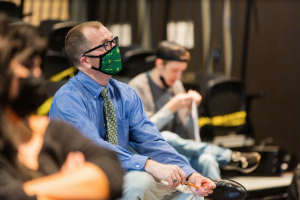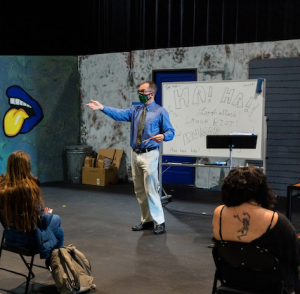David Eshelman: The Show Must Go On
Performing arts have been around for ages. People have passed along tales of their ancestors around campfires long before there was written word. Later, these storytellers put together their tales in the form of plays written and performed as entertainment for others.
Dr. David Eshelman, department head for ATU’s Communication and Journalism Department, theatre director and professor of communication, was born to be a playwright.
“I believe that—especially within theater—people are, at their core, certain things,” said Eshelman. “And I was always the playwright.”
As a small child, Eshelman would perform puppet shows for family. When he was in kindergarten, he organized and directed his first play: his classmates recreating a scene from “Star Wars.” By the time he reached high school, Eshelman had a public access television show with animated features.
“Now, if I were an animator, the art would have been good,” explained Eshelman “[But] it was about telling stories. If I were an actor, I would have been interested in role-playing and costumes, but I was never interested in that. So, I was a playwright, and it’s something I almost couldn’t escape.”

Eshelman’s classes involve students demonstrating their skills. From Intro to Theatre to advanced classes in the subject, all students are expected to perform in front of an audience. For Eshelman, just talking about how to do things is a disservice to his students; he wants them to learn by doing whether it’s reciting a monologue for an acting class or trying their hands at writing a play. He wants his students to find something they love and improve upon it.
“I think that is an important lesson,” said Eshelman. “At Tech, we like to talk about how we can bring things to our students, but I think students need to understand who they are and then find ways that they’re not fighting against that identification.”
Originally from Buffalo, New York, Eshelman earned his Ph.D. from the University of Missouri. When searching for a teaching position, Arkansas was a nearby place he considered. After arriving at ATU in 2006, Eshelman felt at home in Arkansas because it held similarities to Buffalo, which is an eight-hour drive from New York City.
According to Eshelman, being from Buffalo means “being in an environment where we’re wonderful, but everybody doesn’t necessarily know our own worth. We’ve got New York City [with people] carrying on about how fantastic it is, especially in the field of theatre, and you’ve got Buffalo where people are not paying attention. That does not mean that Buffalo is not full of amazing, wonderful artists and fantastic people.
“I think Arkansas is much the same way in relation to the United States,” continued Eshelman. “It’s a fantastic place that is not always paid attention to. So, we have to understand our own worth, and we have to understand that not everybody else is going to reward us for simply being us like they do in other states. That stick-to-itiveness, that ingenuity is something I really admire about the state of Arkansas and about this particular institution within the state.”
During the COVID-19 pandemic, Eshelman was impressed by the ways his students handled submitting their assignments via video. He mentioned with a chuckle, one student who didn’t have an acting partner, so she performed a Shakespearian scene with her cat, which Eshelman described as “just wonderful and fantastic.”
The fall play was presented as a live-stream event, similar to how 1950s television shows were aired live. The Greek setting and masks worn as part of their costumes helped the students hide their masks worn to prevent the spread of COVID-19.
The spring play was conceived as a movie from the beginning with the anticipation that no live audiences could be in attendance. It was also the first play at ATU in which Spanish was used. Not speaking Spanish, Eshelman relied on the expertise of faculty in World Languages and Spanish-speaking students.
At the time of our interview in April 2021, Eshelman was back in the classroom teaching stand-up comedy writing, which challenged his students to get outside their comfort zones—a skill he feels will be helpful later in their lives.

“I think that one of the bravest things you can do is stand up in front of a crowd and be a stand-up comedian,” said Eshelman. “I think almost every person wants to do it. But it’s your words, and you get instant feedback on your success and failure in a way that is potentially extremely embarrassing, but also potentially extremely rewarding. It was amazing to see my students do this thing that so many people want to do.”
Though media has changed significantly over the last 20 years, Eshelman feels that the essential skills taught in the Communication, Theatre and Journalism programs will remain the same. Of course, the programs are adapting as new technology and software emerges. Social media influencing is a newer course offering in the department based on the requests of students.
The Theatre program will continue doing their radio podcast as it has for the past four years, and they will also return to performing live plays as soon as possible. Eshelman says that live performances will never go away, but the department will always embrace new forms of expression.
“As long as we care about the world in which we live, we’ll need to make sense of it, either by finding out details and facts about it, or by creating artistic objects,” said Eshelman. “How we present these objects and how we alter the way we create them in order to fit these new modes of presentation will change. When we see a new platform, we run forward rather than away from it, and that is the future of communication and journalism.”
In addition to his teaching duties, Eshelman is active in Faculty Senate at ATU because he feels that shared governance is vital to an institution’s success and mission to educate students.
“I think faculty have a unique role within the institutions in which they work that is not found in a lot of environments,” he said. “They have a position that is not found in all fields, and they are justly protected by doctrines of tenure, which enables them to see themselves as stewards of the university.
“The assumption, I think, is if a faculty member goes through the initiation processes of tenure and then promotion, that they’re going to be here for the long haul,” continued Eshelman. “[Faculty] are extremely invested in the success—not only of our current incarnation—but of the institution as a whole. For that reason, shared governance—at its best—enables faculty to act upon the investment they feel in the institution.”
In his spare time, Eshelman enjoys spending time with his family and reading biographies and books about silent movies. A new hobby for Eshelman is creating content for TikTok, a short video social media platform. Though he jokingly described his TikTok channel as “not successful,” having it allows him another way to connect with his students on this relatively new platform.
“The opportunities of today are there right now, and now is the time we can break into them,” concluded Eshelman. “That is one thing that I strongly urge—for my students to find their place on the ground floor of these new opportunities that are going to be the big industries of tomorrow.”
-By Brandi Easterling Collins
for the Tech Action, Fall 2021
